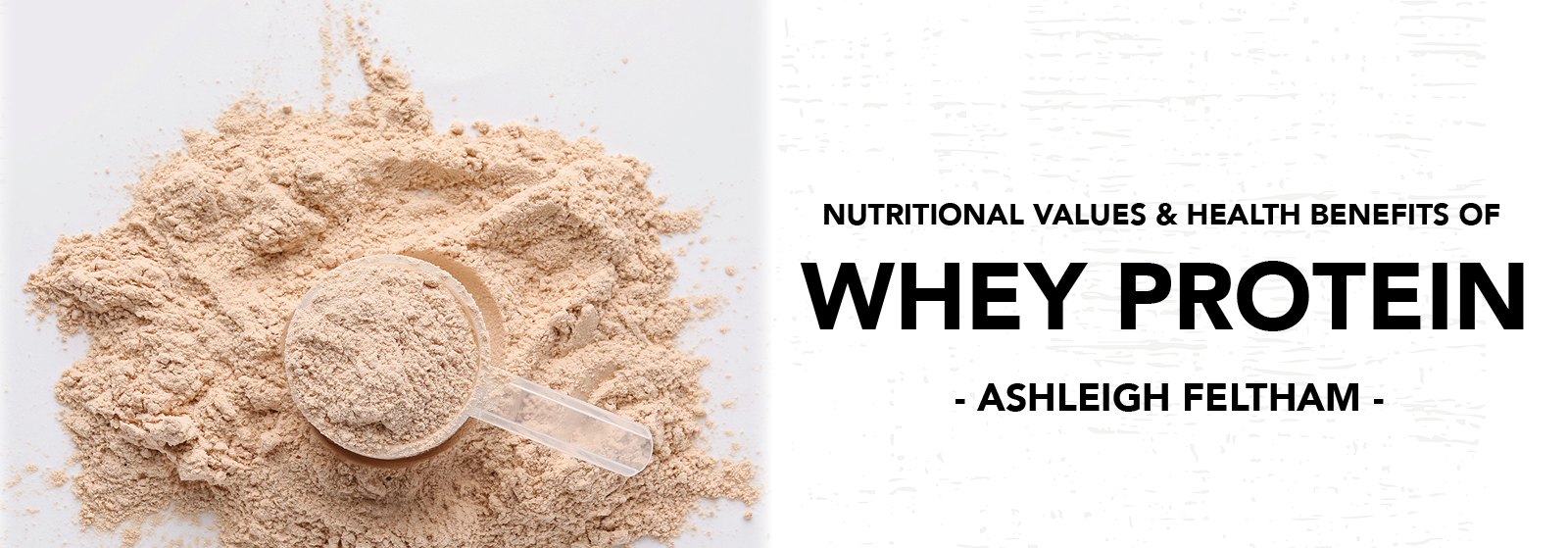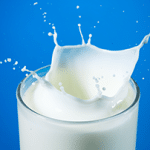There are many nutrition supplements on the market. The one that you have likely heard about is whey protein. Whey protein has many potential health benefits. Some of these benefits include supporting new muscle growth and optimising your muscle strength, helping you to maintain your muscle mass, keeping you feeling fuller for longer and may help maintain a healthy body weight (Morton RW et al. 2017, Kung B et al. 2018).
Where Does Whey Protein Come From?
Whey protein is made from milk, a natural food source. There are two types of protein found in milk, these are called whey and casein (Ma F et al. 2019). To make whey protein, the whey is separated during processing from the casein using enzymatic reactions.
The final whey protein product is a complete protein. This means it contains all the amino acids or building blocks to make a protein. Essential amino acids need to come from your diet as your body cannot make these amino acids by itself.
Of the essential amino acids, the ones which play a key role in stimulating new muscle growth are the BCAAs or branched chain amino acids. These are leucine, isoleucine, and valine. Leucine is an especially important amino acid as it stimulates a factor called mTOR which sets off a cascade of processes ultimately leading to muscle protein synthesis. Research suggests around 3g of leucine is needed for optimal lean muscle synthesis (Churchward-Venne et al. 2014, Rowlands et al. 2015).
What Are the Different Types of Whey Protein
There are two main forms of whey protein:
- Whey Protein Isolate: this is considered the higher quality whey protein type as it contains less carbohydrate, minimal to no lactose and a high amount of protein.
- Whey Protein Concentrate: This variety has slightly higher levels of carbohydrate and is considered a lower quality of whey protein.
Both varieties are rapidly digested in your body and are best taken 30-90 minutes post workout for rapid recovery. (Tetra Pack, 2015)
Whey Protein to Promote Muscle Gains and Power
To gain more muscle there are several components to include. The first part to include is exercise. Specifically, stimulating the muscle through resistance training. Resistance training is recommended to be included around three times per week but is dependant on your individual needs and circumstances. Always consult with your doctor before beginning a new exercise program and seek the support of an exercise professional to get started.
The second component is achieving your protein needs to stimulate muscle growth. This is recommended at around 1.6 grams of protein per kilogram (Morton RW et al. 2018). Whey protein can be a useful inclusion to an overall balanced diet to help you to maintain and achieve greater muscle mass. It is best for muscle growth and maintenance to spread your protein throughout the day. Per meal, the optimal amount of protein is between 20-40g to promote muscle growth (Kristi Wempen, 2022).
In addition to promoting muscle growth, whey protein may promote increased muscle strength. Research suggests that whey protein may increase your maximum muscle strength in one repetition (Morton RW et al. 2018). Whey protein may also increase your overall muscle strength and functional capacity.
Whey Protein for Weight Loss
If you have decided to lose weight it is important to maintain your lean body mass for health and function. Research suggests that leucine rich, whey protein may help to reduce loss of your muscle mass whilst losing weight (Smith GI et al. 2018).
Protein can help you to feel fuller for longer and promotes the maintenance of a healthy weight and makes weight loss easier. It does this by reducing the hunger hormones such as ghrelin and increasing factors such as hormone peptide YY (PYY) (Lejeune MP et al. 2006, Batterham RL et al. 2006). Hormone peptide YY (PYY) increases feelings of satiety (Batterham RL et al. 2006).
When you eat different macronutrients, or fat, protein, and carbohydrate, these take different amounts of energy to metabolise. This is called the thermic effect of food. Fat takes around zero to three percent to metabolise, carbohydrates take around five to ten percent to metabolise and protein is the most at around twenty to thirty percent (Westerterp KR. 2004). This puts the equation to lose weight more in your favour when you include more protein in your diet.
How to Use Whey Protein
Whey protein can be a healthful addition to an overall balanced diet. There are many ways to use whey protein. The most common would be as a shake with water or milk but it can also be added to cereal, be used as an ingredient in your baking to make higher protein muffins and cakes, and included in smoothies.
Take home message: Whey protein is sourced from a natural food and backed by much research. The addition of this nutrition supplement to your diet may provide the missing link to achieving your nutrition and health goals.
References:
- Morton RW, Murphy KT, McKellar SR, Schoenfeld BJ, Henselmans M, Helms E, Aragon AA, Devries MC, Banfield L, Krieger JW, Phillips SM. A systematic review, meta-analysis and meta-regression of the effect of protein supplementation on resistance training-induced gains in muscle mass and strength in healthy adults. Br J Sports Med. 2018 Mar;52(6):376-384. doi: 10.1136/bjsports-2017-097608. Epub 2017 Jul 11. Erratum in: Br J Sports Med. 2020 Oct;54(19):e7. PMID: 28698222; PMCID: PMC5867436.
- Kung B, Anderson GH, Paré S, Tucker AJ, Vien S, Wright AJ, Goff HD. Effect of milk protein intake and casein-to-whey ratio in breakfast meals on postprandial glucose, satiety ratings, and subsequent meal intake. J Dairy Sci. 2018 Oct;101(10):8688-8701. doi: 10.3168/jds.2018-14419. Epub 2018 Aug 20. PMID: 30139624.
- Ma F, Wei J, Hao L, Shan Q, Li H, Gao D, Jin Y, Sun P. Bioactive Proteins and their Physiological Functions in Milk. Curr Protein Pept Sci. 2019;20(7):759-765. doi: 10.2174/1389203720666190125104532. PMID: 30678623.
- Churchward-Venne, T. A., Breen, L., Di Donato, D. M., Hector, A. J., Mitchell, C. J., Moore, D. R., … & Phillips, S. M. (2014). Leucine supplementation of a low-protein mixed macronutrient beverage enhances myofibrillar protein synthesis in young men: a double-blind, randomized trial. The American journal of clinical nutrition, 99(2), 276-286.
- Rowlands, D. S., Nelson, A. R., Phillips, S. M., Faulkner, J. A., Clarke, J., Burd, N. A., … & Stellingwerff, T. (2015). Protein-leucine fed dose effects on muscle protein synthesis after endurance exercise. Med Sci Sports Exerc, 47(3), 547-555.
- Morton RW, Murphy KT, McKellar SR, Schoenfeld BJ, Henselmans M, Helms E, Aragon AA, Devries MC, Banfield L, Krieger JW, Phillips SM. A systematic review, meta-analysis and meta-regression of the effect of protein supplementation on resistance training-induced gains in muscle mass and strength in healthy adults. Br J Sports Med. 2018 Mar;52(6):376-384. doi: 10.1136/bjsports-2017-097608. Epub 2017 Jul 11. Erratum in: Br J Sports Med. 2020 Oct;54(19):e7. PMID: 28698222; PMCID: PMC5867436.
- Kristi Wempen, 2022. Mayo Clinic Health System. Are You Getting Too Much Protein? https://www.mayoclinichealthsystem.org/hometown-health/speaking-of-health/are-you-getting-too-much-protein
- Smith GI, Commean PK, Reeds DN, Klein S, Mittendorfer B. Effect of Protein Supplementation During Diet-Induced Weight Loss on Muscle Mass and Strength: A Randomized Controlled Study. Obesity (Silver Spring). 2018 May;26(5):854-861. doi: 10.1002/oby.22169. PMID: 29687650; PMCID: PMC5918424.
- Lejeune MP, Westerterp KR, Adam TC, Luscombe-Marsh ND, Westerterp-Plantenga MS. Ghrelin and glucagon-like peptide 1 concentrations, 24-h satiety, and energy and substrate metabolism during a high-protein diet and measured in a respiration chamber. Am J Clin Nutr. 2006 Jan;83(1):89-94. doi: 10.1093/ajcn/83.1.89. PMID: 16400055.
- Batterham RL, Heffron H, Kapoor S, Chivers JE, Chandarana K, Herzog H, Le Roux CW, Thomas EL, Bell JD, Withers DJ. Critical role for peptide YY in protein-mediated satiation and body-weight regulation. Cell Metab. 2006 Sep;4(3):223-33. doi: 10.1016/j.cmet.2006.08.001. PMID: 16950139.
- Westerterp KR. Diet induced thermogenesis. Nutr Metab (Lond). 2004 Aug 18;1(1):5. doi: 10.1186/1743-7075-1-5. PMID: 15507147; PMCID: PMC524030.
- Nabuco HCG, Tomeleri CM, Sugihara Junior P, Fernandes RR, Cavalcante EF, Antunes M, Ribeiro AS, Teixeira DC, Silva AM, Sardinha LB, Cyrino ES. Effects of Whey Protein Supplementation Pre- or Post-Resistance Training on Muscle Mass, Muscular Strength, and Functional Capacity in Pre-Conditioned Older Women: A Randomized Clinical Trial. Nutrients. 2018 May 3;10(5):563. doi: 10.3390/nu10050563. PMID: 29751507; PMCID: PMC5986443.
- Dairy Processing Handbook, Chapter 15, Tetra Pack, 2015, WHEY PROCESSING | Dairy Processing Handbook (tetrapak.com)






